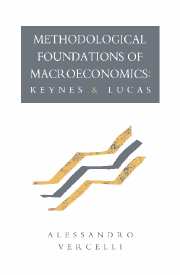Book contents
- Frontmatter
- Contents
- Preface
- List of abbreviations
- 1 Introduction
- Part 1 Methodological foundations of macroeconomics
- 2 Equilibrium, disequilibrium and economic theory
- 3 Dynamic instability and economic models
- 4 Structural instability and economic change
- 5 Uncertainty, predictability and flexibility
- 6 Rationality and expectations
- 7 Probabilistic causality and economic analysis: Suppes, Keynes, Granger
- Part II Keynes after Lucas
- References
- Subject index
- Author index
5 - Uncertainty, predictability and flexibility
Published online by Cambridge University Press: 05 January 2012
- Frontmatter
- Contents
- Preface
- List of abbreviations
- 1 Introduction
- Part 1 Methodological foundations of macroeconomics
- 2 Equilibrium, disequilibrium and economic theory
- 3 Dynamic instability and economic models
- 4 Structural instability and economic change
- 5 Uncertainty, predictability and flexibility
- 6 Rationality and expectations
- 7 Probabilistic causality and economic analysis: Suppes, Keynes, Granger
- Part II Keynes after Lucas
- References
- Subject index
- Author index
Summary
My second maxim was to be as firm and decisive in my actions as I could … imitating a traveller who, upon finding himself lost in a forest, should not wander about turning this way and that, and still less stay in one place, but should keep walking as straight as he can in one direction, never changing it for slight reasons even if mere chance made him choose it in the first place; for in this way, even if he does not go exactly where he wishes, he will at least end up in a place where he is likely to be better off than in the middle of a forest.
(Descartes, 1637, pp. 24–5)Introduction
A monetary economy is a very complex system and is thus very likely to be characterized by structural instability. This implies a certain degree of irreducible unpredictability, with regard not only to the exact value of the outcomes of the stochastic process, but also to the characteristics of the stochastic process itself. Hence the economic agent has to face a disturbing amount of‘structural uncertainty’ over the future evolution of the structure of the environment (‘environmental uncertainty’) and of the economic system (‘systemic uncertainty’). Unfortunately, structural uncertainty cannot be reduced to the kind of uncertainty (often called ‘risk’) which can be easily dealt with in economic models. The concept of uncertainty, in a stronger sense, now urgently requires a creative effort of analysis.
In this chapter I shall introduce and clarify the distinction between ‘risk’ and ‘uncertainty’, and outline some of its implications. It is a distinction used by both Lucas and Keynes, as well as many of their followers.
- Type
- Chapter
- Information
- Methodological Foundations of MacroeconomicsKeynes and Lucas, pp. 71 - 90Publisher: Cambridge University PressPrint publication year: 1991



